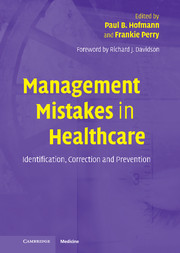Book contents
- Frontmatter
- Contents
- Notes on the contributors
- Foreword
- Preface
- Acknowledgments
- Part I Addressing management mistakes in healthcare
- 1 Acknowledging and examining management mistakes
- 2 The context of managerial mistakes
- 3 Identifying, classifying, and disclosing mistakes
- 4 What medical errors can tell us about management mistakes
- 5 Correcting and preventing management mistakes
- 6 A question of accountability
- Part II Case studies of mistakes in healthcare management
- Suggested further reading
- Index
- References
6 - A question of accountability
Published online by Cambridge University Press: 12 October 2009
- Frontmatter
- Contents
- Notes on the contributors
- Foreword
- Preface
- Acknowledgments
- Part I Addressing management mistakes in healthcare
- 1 Acknowledging and examining management mistakes
- 2 The context of managerial mistakes
- 3 Identifying, classifying, and disclosing mistakes
- 4 What medical errors can tell us about management mistakes
- 5 Correcting and preventing management mistakes
- 6 A question of accountability
- Part II Case studies of mistakes in healthcare management
- Suggested further reading
- Index
- References
Summary
It is one thing to commit an error, whether intentional or not. It is another thing to be the person on whose watch an error is committed by another party. And it is yet another thing to be willing to be held accountable for either type of mistake, and to accept the consequences. But the truth is that if there is no accountability for managers and organizations, or if there are no consequences that affect them – no matter how devastating the damage done – then there is no reason not to commit errors or even felonies. Accountability and impunity are mutually exclusive.
The psychology of accountability
We learn from a very early age that accountability has a price. If a group of children is playing baseball, and an errant hit goes through the neighbor's window, the children's inherent tendency is to run away so as not to get “caught.” Rare is the child who will ring the neighbor's doorbell and say, “I did it.” And although most parents, churches, and schools try to teach children that they should “own up” to what they have done, in too many cases that lesson is overwhelmed by experience – that is, once children learn that confessing is not enough, but that consequences also must be faced, their willingness to be held accountable diminishes.
- Type
- Chapter
- Information
- Management Mistakes in HealthcareIdentification, Correction, and Prevention, pp. 103 - 116Publisher: Cambridge University PressPrint publication year: 2004

